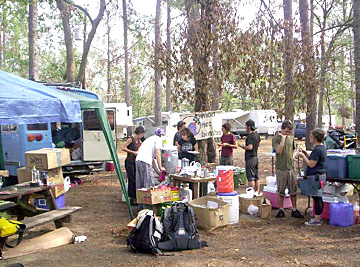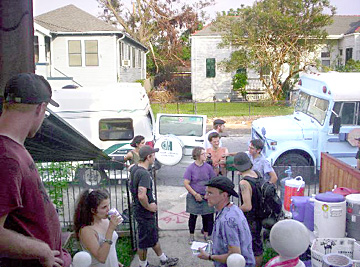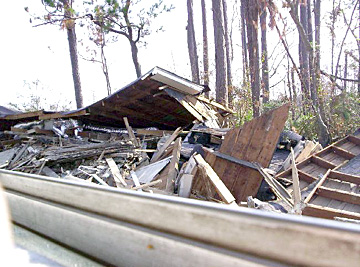Our new all-devices website!
Visit RQ at our new wix-based, all-devices website. Same great RQ content, now viewable on phones, tablets, etc.
This site (ReclaimingQuarterly.org) is still fully functional, but is no longer being updated.
Visit us at WeaveAndSpin.org!

playlists, streaming and downloads
Links to free listening
at youtube, google, spotify, and more!
Favorite RQ Features
 Older
Features Older
Features

|

Features from New Orleans
* denotes most recent updates
Who Will Take Out the Garbage?
A Report from New Orleans
It's like a scene out of a post-apocalyptic movie-a crowd of people gathered in the street outside the local tavern in the Bywater district of the Ninth Ward. The lower Ninth Ward, a few blocks away, is the scene of the worst destruction, but this eclectic neighborhood, one of the centers of alternative culture in New Orleans, has fortunately escaped heavy damage. Still, roofs are off, houses are molding away from the inside, and the streets are piled with garbage that, six weeks after the hurricane, has not been picked up.
The people gathered are black, white, gay, straight, a motley mix of artists and old-time Cajuns and circus performers, all talking madly and hugging each other and drinking beer. Malik, a founder of the Common Ground Collective, calls them to order. He makes me think of an old lion, with his mane of dreadlocks, turning his big head slowly from side to side, surveying an unruly pride. He outlines the work Common Ground has done in Algiers, tells them that if they can organize themselves, Common Ground can provide supplies and volunteers. Everyone is talking at once and interrupting each other, but there's a lively, charged energy.
"What do you need here?" Malik asks.
"Garbage," people thunder back. There's a chaotic but unanimous agreement that garbage pickup is their first priority, and several people begin simultaneously to outline their failed attempts to get the city to do something.
Malik stops them. "If the city won't do it, you got to do like we did across the river, and do it yourself. Now, who wants to do that? Who will volunteer?"
Most of the people raise their hands.
"When do you want to begin?"
"Now!"
We meet the next morning in Washington Square Park, where a kitchen from the Rainbow Family is providing the best free food in town, far, far better than the Styrofoam-packed chili dogs or military ration MREs (Meals Ready to Eat) available from the official relief organizations. Over eggs and pancakes, we get organized.

Food Not Bombs kitchen at the Common Ground house in the 9th Ward of New Orleans
Who will take out the garbage? It's the question always posed to any vision of utopia. Who will do the dirty work?
We will. Come on, it'll be fun, you'll enjoy it. And if we just start doing what needs to be done, others will join us and the work will go fast and pleasantly.
About fifteen of us head out, a mix of Common Ground volunteers and far fewer of the local community than raised their hands the night before We start at the corner by the bar where we met the night before, and begin picking up sacks of trash, plastic bags full of rotting food waste, and all the debris ejected from people's flooded homes and shops. The small corner store has half its roof off and its contents on the street. We sling the bags into the back of pickup trucks, and pile it all on the meridian divider of a main street nearby, where the city can't easily overlook it. We separate brush from mixed garbage, and stack anything usable separately. It's hard work, and dirty, physical and sweaty and fun, like going to the gym, but more fun really because we're working together. And satisfying as only cleaning up a really, really dirty mess can satisfy.
Tomorrow we will try to get a flat-bed trailor and pick up refrigerators. Almost every house on the block-in the entire area, has a dead refrigerator, some taped shut. People are warned not to open them inside the house, that you can't get rid of the smell. You can clean them time and again with bleach, leave them baking in the sun for days-and still days later the smell will remain and bugs will be pouring out of the innards. The phenomenal waste of the embodied energy in all these appliances is appalling, but I can't think of any real good use for them myself except possibly to fill them with cob, cement them shut and stack them for natural building blocks. A refrigerator-block wall-good insulation, poor thermal mass, and really hard to get anything else to attach solidly. And the bugs would still be a problem. But these are the sorts of things the mind ponders while picking up trash.
Meanwhile Juniper makes a valiant attempt to alert the city agencies that the trash will need to be picked up. She is told to call 211, for Emergency Services. Emergency Services tells her that the Southern Baptist Convention is responsible for solid waste disposal. Huh?? Even in Bush's new faith-based world, we can't quite believe this. She tries the local waste management company-they say that the mayor has replaced them the week before with the Army Corps of Engineers. Juniper eventually gets through to some puzzled woman at a phone service in Tennessee from the Corps who has no idea what she's talking about. After an hour and twenty-five phone calls, she's back to 211 and the Baptists. Now, the Baptists are a fine religious organization but we had no idea they were experts in solid waste management. Maybe it's the immersion thing-some deep religious connection to cleanliness? Accept Jesus into your heart, and He will rapture your dead refrigerator into some other dimension? If every Baptist in the south were to suddenly appear in New Orleans and pick up even one sack of garbage, we could get the place clean in a day, but really, a few Bobcats and some big garbage trucks would actually be more to the point. Couldn't we just go back to the Mafia? Or, what a radical idea, what if everyone in the city and the country regularly tithed some of their income to provide the services everyone needs, so we could pool our money and afford things like bulldozers and regular trash pickup that actually got around to all the neighborhoods where people lived? We used to have such a thing-it was called 'government' before Bush and his cronies on the far right began to systematically starve it and convince people that it was better to depend on religious charity to solve all their problems.

Food Not Bombs serving food at the volunteer camp in Covington.
But the Baptists are not all that well schooled in solid waste management-we're not sure they even know that the City of New Orleans is expecting them to pick up trash in the Ninth Ward. In any case, they are not in evidence here. Instead, it's a group of neighborhood folks and a few volunteers I know for a fact are Pagans, anarchists, atheists and other undesirables, who have just started doing it.
Across the street, a battered white house sports a big American flag. The man inside, a big Cajun guy in a baseball cap, comes over and offers us water. He's an ex-marine who used to train the Contras in Honduras to attack the Sandinistas, I'm told, until he became sickened by what was going on. He's delighted we're cleaning up the neighborhood, tells us stories of the hurricane, how after it was over the neighbors all got together and had a big barbecue with the meat that would otherwise rot in their freezers. He tells us how he worried about the older black folks across the street who had diabetes, tried to get them fruit and keep them fed.
"I don't understand racism," he says. "I've got six kind of blood in my veins. My people been here for generations, five thousand years. I'm part Chittimacha Indian. The reason I look white-my mother married a German, but my great-grandaddy was a six foot African man."
He was one of the snipers, who sat on his roof with his rifle to shoot suspected looters. The area is full of signs that say, "We are home, you are being watched!" "Mean dogs inside." "This area protected by Smith and Wesson."
He put up his flag as soon as the wind stops-but he hates the government. To him, that flag means the American people.
"This is so great," he says as he brings us over cold water and hand sanitizer. "And that it's people doing it, not the government."
At the end of the day we go over to BJ's, the neighborhood bar where everyone hangs out. "This is our living room," one woman tells me. They are newly back-today is the first day many people have come home, and it is so beautiful to see how happy everyone is to be back. They are running up to each other and hugging their neighbors, laughing and crying. One of them buys beers for everybody on the cleanup crew-we have forty offered to us within half an hour, more than we can drink.
It's what's so wonderful about New Orleans, and so different from most cities in this country-these tight-knit communities, where neighbors know each other and care about each other and have place where people go and meet and hang out together, Cajuns and radicals and artists and circus performers, newcomers and old timers all.
"Click your heels together three times-we're home!" says another big guy in a baseball cap, beaming. They all hug us and thank us. They're dealing with the damage in their own homes, trying to clean up and clear out and make them liveable before they get back to work-if they still have jobs.
"But will people come back, do you think?" I ask a blond woman who is trying to get me inside to play pool.
"They'll be back," she assures me. "You won't be able to keep them away. We have a neighborhood blog, and we've kept in contact, and everything all over it is all, "when can we go home?' 'When will they let us back?' 'We want to go home!'
Then Juniper and Lisa and I head out. We decide to drive through the lower Ninth Ward. Today is the first day that people are being let back in, to all but the very worst-hit neighborhoods. But we talk our way through the checkpoints, and drive through the blasted streets where the levee broke and the homes were assaulted by a mini-tsunami, a twelve-foot high wall of water. It's a scene of unbelievable devastation. Streets reduced to piles of rubble, houses that are nothing but a roof in a sea of mud. One house has floated off its foundation and rests atop a car. A truck has careened into the side of a house, its front end resting on the lintel of a second story window. Other houses are simply piles of wood and scattered shingles.

Remnants of a house.
There is no going back here, no happy homecoming for this neighborhood. No bomber, no invading army, could level it more thoroughly. It is Iraq brought home, literally, because the agent of destruction here was not the hurricane, but human neglect and warped priorities. The money that should have maintained the levees, like the National Guard that could have contained the looters, went to Iraq. Homeland Security, brought to you by Bush and neocons. Do you feel safer, now?
We walk briefly on the street closest to the break in the levee, a sea of churned mud. A room is ripped open, the whole house destroyed, but inside, a chandelier hangs intact. I'm thinking of a story I read somewhere, about a poor Southern family, where the mother's deepest desire, her symbol of everything that meant comfort and safety and beauty and a good life, was a chandelier. In the story, they finally got one, and then some catastrophe struck, I don't remember what. But this chandelier, intact among the ruins, seems to symbolize that some hopes and dreams can survive even this devastation. They might not be my hopes, or my dreams, or my vision of what is beautiful, but they are someone's.
And that's my own particular faith-that if we support each others' dreams, if we deal with the garbage, if we take care of each other and do what needs to be done, some beauty will be born out of all of this mess. Click your heels together. There's no place like home.
Starhawk is an activist, organizer, and author of The Earth Path, Webs of Power: Notes from the Global Uprisin, The Fifth SacredThing and other books on feminism, politics and earth-based spirituality. She teaches Earth Activist Trainings that combine permaculture design and activist skills, www.earthactivisttraining.org, and works with the RANT trainer's collective, www.rantcollective.net, that offers training and support for mobilizations around global justice and peace issues. Contact www.starhawk.org
How You Can Help
Donations are urgently needed for all aspects of the rebuilding effort. You can donate directly to Reclaiming folks working in New Orleans via PayPal by clicking this link:
Donate to the Pagan Cluster's New Orleans work.
If you want to support a local New Orleans grassroots group with whom Reclaiming is working, you can donate to Common Ground at their website: www.commongroundrelief.org
For more information
Email katrina@pagancluster.org
There is also useful and updated information at the following web-sites:
www.commongroundrelief.org
www.pagancluster.org
Photos by Arizona Indy Media, arizona.indymedia.org. Please do not copy, reproduce, fold, spindle, mutilate, or otherwise use them without contacting them. Thanks!
|



